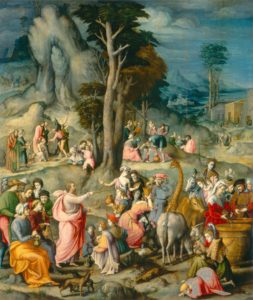Thoughts on Sunday’s Lessons for Aug. 5, 2018

The Gathering Of Manna (c.1540-1555), oil painting on panel by Francesco d’Ubertino Verdi, called Bachiacca (1494-1557). Samuel H. Kress Collection, National Gallery of Art, Washington, D.C. (Click image to enlarge.)
Last Sunday we heard the shocking story of King David raping the beautiful Bathsheba, then arranging to have her husband, Uriah, killed in battle so David could have Bathsheba for himself. Now we get the rest of the story. The prophet Nathan, sent by God, tells David about a rich man who selfishly took and slaughtered a poor man’s beloved lamb. Angry, David curses the rich man and threatens to have him killed, only to hear Nathan’s charge, “You are the man!” A merciful God threatens David with serious punishments but spares his life. In the verses just after this passage, though, Nathan foretells that the child of David’s illicit union shall die.
First Reading (Track Two): Exodus 16:2-4, 9-15
Our readings this Sunday focus on bread as a metaphor for God’s abundant love. From God’s gift of manna to God’s gift of grace through Jesus, we hear about the bread of life. Think back to last Sunday’s First Reading about the prophet Elisha feeding 100 people with a few barley loaves: As he did so, he recalled that God had promised the people that “They shall eat and have some left.” In today’s reading we go back to the verses of which Elisha spoke, when God provided abundant manna, a gift of bread in the desert.
Psalm (Track One): Psalm 51:1-13
We also heard this familiar Psalm earlier this year on the fifth Sunday of Lent, but it certainly bears repeating in the context of King David’s adultery and murder. The Psalm’s powerful narrative envisions David wracked in repentant guilt as he confronts his great sin. In poetic words that mirror the promises of God’s covenants with the people, David pours out his shame and grief. He makes no excuses for his wicked acts, but begs for God’s mercy and forgiveness. “Create in me a clean heart, O God,” David begs; create a clean slate upon which God can write a new covenant of love.
Psalm (Track Two): Psalm 78:23-29
The Psalmist remembers God’s gift of manna and gives thanks to the Creator who saw the people’s need and poured down on them all the bread and quails that they could eat. God gave them what they craved and filled them up. To gain context for these verses, turn back and look at the preceding verses of this Psalm, which recalls how God made a covenant with the people and led them out of slavery in Egypt. It tells how God cared for them, and, despite their ungrateful complaints and rebellion, God set aside divine anger and fed them with love.
Second Reading: Ephesians 4:1-16
The author of Ephesians, writing in Paul’s name a generation or two after Paul, seems to draw in this reading from the wellsprings of Paul’s memorable writing in First Corinthians. Like Paul, Ephesians envisions the Christian community as Christ’s body, in which each of us acts according to our gifts. We are all called to work together with humility and gentleness to make the body function, living in unity as one body and one spirit, “one Lord, one faith, one baptism, 6one God and Father of all.”
Gospel: John 6:24-35
The crowds around Jesus continue following him around the shores of Galilee. Having watched his miraculous healings and shared in the bountiful loaves and fishes, they are fascinated by this remarkable rabbi. They want to know more about him, and Jesus comes right out and tells them: they want more bread. Don’t fret about the world’s bread that does not last, Jesus tells them. Continuing his extended discussion about the bread of life that we will hear in John’s Gospel through August, he declares, “I am the bread of life. Whoever comes to me will never be hungry, and whoever believes in me will never be thirsty.”
What are “Track 1” and “Track 2”?
During the long green season after Pentecost, there are two tracks (or strands) each week for Old Testament readings. Within each track, there is a Psalm chosen to accompany the particular lesson.
The Revised Common Lectionary allows us to make use of either of these tracks, but once a track has been selected, it should be followed through to the end of the Pentecost season, rather than jumping back and forth between the two strands.
For more information from LectionaryPage.net, click here.
